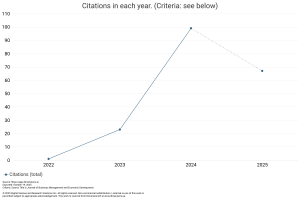Effect of Financial Literacy and Fintech Payment of Financial Management Behavior with Internal Locus of Control as Moderator
DOI:
https://doi.org/10.59653/jbmed.v1i02.124Keywords:
fintech payment, financial literacy, financial management behavior, internal locus of controlAbstract
This study examines private university students in West Jakarta which aims to determine the effect of financial literacy and fintech payments on financial management behavior with internal locus of control as a moderator variable. The dependent variables used are financial literacy and fintech payments. The analysis of this study used multiple linear regression with SPSS 27 (Statistical Package for Social Science). The results of this study indicate that: (a) financial literacy influences financial management behavior; (b) fintech payments affect financial management behavior; (c) internal locus of control strengthens the relationship between financial literacy and financial management behavior; (d) the internal locus of control strengthens the relationship between fintech payments and financial management behavior.
Keywords:financial literacy, fintech payments, financial management behavior, locus of control
Downloads
References
Ajzen, I. (1991). The theory of planned behavior. Organizational Behavior and Human Decision Processes, 50, 179–211.
Amihsah, Z., Habib, M., & Azman-Saini, W. (2020). Faktor-faktor yang mempengaruhi adopsi fintech di Indonesia. Jurnal Pemasaran Jasa Keuangan, 25(3), 103–115. https://doi.org/10.1057/s41264-020-00087-7
Aziz, A. (2021, August 4). Literasi Keuangan Generasi Milenial. https://investor.id/editorial/243880/literasi-keuangan-generasi-milenial
Dian, A. S. (2015). Finalcial Literacy Dan Perilaku Keuangan Mahasiswa (Studi Kasus Mahasiswa Stie "Yppi‟ embang). Jurnal Buletin Bisnis & Manajemen, 1(2), 177–189.
Herdjiono, I., & Damanik, L. A. (2016). Pengaruh financial attitude, financial knowledge, dan parental income terhadap financial management behavior. Jurnal Managemen Teori Dan Terapan, 9(3), 226–241.
Hidayah, N., & Martani, D. (2019). Fintech dan perilaku pengelolaan keuangan: Peran locus of control sebagai variabel moderasi. Jurnal Keuangan Dan Perbankan, 23(2), 206–216.
Kholilah, N. A., & Iramani, Rr. (2013). Studi Financial Management Behavior Pada Masyarakat Surabaya. Journal of Business and Banking, 3(1), 69. https://doi.org/10.14414/jbb.v3i1.255
Kim, Y., Choi, J., Park, Y. J., & Yeon, J. (2016). The adoption of mobile payment services for “ intech.” International Journal of Applied Engineering Research, 11(2), 1058–1061.
Lusardi, A., & Mitchell, O. S. (2014). The Economic Importance of Financial Literacy: Theory and Evidence. Journal of Economic Literature, 52(1), 5–44.
Mukti, V. W., Rinofah, R., & Kusumawardhani, R. (2022). Pengaruh fintech payment dan literasi keuangan terhadap perilaku manajemen keuangan mahasiswa. Akuntabel, 19(1), 52–58. https://doi.org/10.30872/jakt.v19i1.10389
Rotter, J. B. (1966). Generalized Expectancies for Internal versus External Control of Reinforcement.
Sari, Y., & Yuningsih, A. (2020). Literasi Keuangan dan Perilaku Manajemen Keuangan: Peran Mediasi Kecemasan Keuangan. Jurnal Ilmiah Mahasiswa Ekonomi Akuntansi, 5(1), 46–56.
Selian, S. R. R. (2020). Pengaruh Financial Attitude, Financial Knowledge dan Financial Technology Terhadap Perilaku Manajemen Keuangan (Studi Kasus Mahasiswa Fisip Universitas Sumatera Utara). https://repositori.usu.ac.id/handle/123456789/30379
Suwastika, I., & Adnyana, I. (2018). Locus of control sebagai moderator pengaruh literasi keuangan terhadap perilaku pengelolaan keuangan. Jurnal Internasional Bisnis Dan Masyarakat, 19(3), 501–512.
Yanuar, A. (2020). Perilaku Pengelolaan Keuangan: Studi Literatur. Jurnal Kepemimpinan Dan Manajemen, 1(1), 29–42.
Downloads
Published
How to Cite
Issue
Section
License
Copyright (c) 2023 Aulia Riska Hidayati; Dwiyanjana Santyo Nugroho

This work is licensed under a Creative Commons Attribution-ShareAlike 4.0 International License.
Authors who publish with this journal agree to the following terms:
- Authors retain copyright and grant the journal right of first publication with the work simultaneously licensed under a Creative Commons Attribution-ShareAlike that allows others to share the work with an acknowledgement of the work's authorship and initial publication in this journal.
- Authors are able to enter into separate, additional contractual arrangements for the non-exclusive distribution of the journal's published version of the work (e.g., post it to an institutional repository or publish it in a book), with an acknowledgement of its initial publication in this journal.
- Authors are permitted and encouraged to post their work online (e.g., in institutional repositories or on their website) prior to and during the submission process, as it can lead to productive exchanges, as well as earlier and greater citation of published work (See The Effect of Open Access).





























